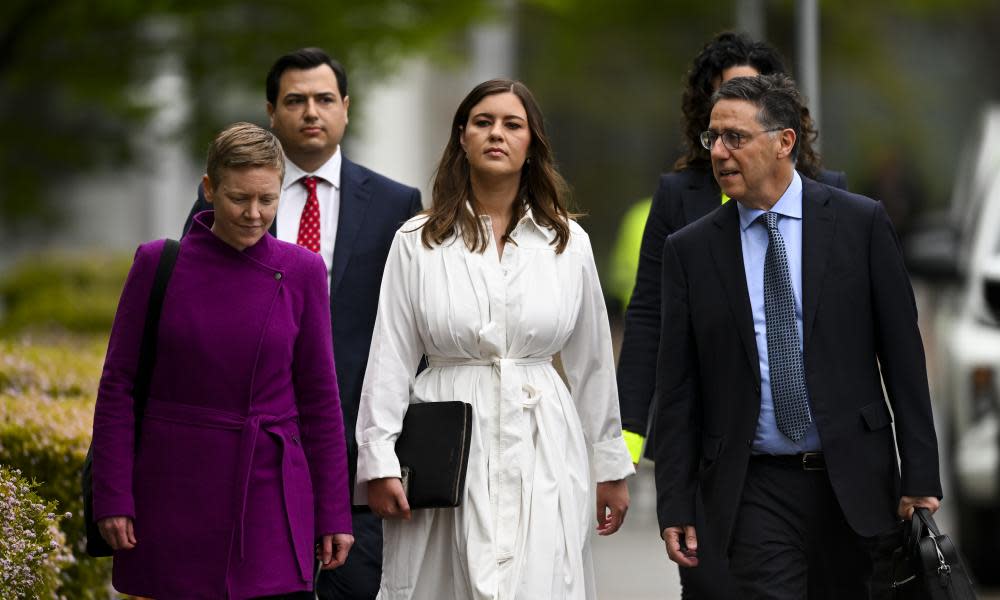Brittany Higgins feared information about alleged rape could flow to Peter Dutton, court hears

Brittany Higgins has told a court she deleted material from her phone prior to submitting it to police because she had simply wanted to “purge” the “horrible parts of my life”, including images of her former boss, Linda Reynolds, and was concerned about the flow of information to the then home affairs minister Peter Dutton.
The cross-examination of Higgins continued on Friday, when defence barrister Steven Whybrow pressed her on the deletion of material from her phone in 2021, as she prepared to reinstate a police complaint against her former colleague and political staffer Bruce Lehrmann.
Higgins has alleged she was raped by Lehrmann, who was then her colleague, in the early hours of 23 March 2019. Lehrmann has denied the allegations and pleaded not guilty to one charge of sexual assault without consent.
The court heard Higgins had deleted a text to a friend and ex-partner, political staffer Ben Dillaway, in April 2019, not long after the alleged rape, telling him that she was not going to proceed with a complaint.
It also heard she purged her phone of pictures of Reynolds, whose office she alleges she was raped in.
“I never wanted to see Linda Reynolds’ face again so I cleared off any photo I had of her,” she said. “I wanted to scrub all the horrible parts of my life.”
Whybrow suggested to her that she wasn’t telling the truth, because she subsequently sent a photo of herself and Reynolds to the News Corp journalist Samantha Maiden.
Higgins said that photo was likely from her Instagram, not held on her personal phone.
Whybrow then suggested Higgins had deleted more than Dillaway’s message and embarrassing photos.
“Yes, I’ve openly admitted it,” Higgins said.
Whybrow suggested that she had also deleted audio files from her phone.
Higgins said she had shared those audio files with as many people as possible before deleting them from her phone. She did that because she was worried about what the police might do with the contents, the court heard.
Whybrow asked her whether she was concerned police would try to “suppress” what was on her phone.
She said she was concerned that information might be passed to the office of the then home affairs minister, Peter Dutton.
Dutton, she told the court, had already publicly revealed “baseline” information about her case, well before she gave her evidence in chief interview to police.
She said she had understood the way the flow of information worked across ministerial portfolios.
Such information was “not siloed”, Higgins said.
“I was very, very scared,” Higgins said, breaking down in tears. “I was seeking legal advice to know my rights because I was terrified.”
The court heard Higgins had also deleted messages with a parliamentary security guard, exchanged in the hours after she left parliament house after the alleged rape.
She said the messages were personal and unrelated to the incident.
Higgins was also quizzed about why she told her then chief of staff, Fiona Brown, and Dillaway, that she either intended to see, or had already seen, a doctor in the wake of the alleged rape.
The court has heard Higgins did not see a doctor.
Whybrow put it to Higgins that she had not seen a doctor because “you hadn’t had sexual intercourse with Mr Lehrmann on that weekend, consensual or otherwise?”.
“You are so incorrect,” Higgins said. “I don’t know if you have ever gone through a trauma before, but confronting it with professionals is a very difficult thing to do.”
Whybrow asked why she had been to see Dillaway on a day she had told her work she needed off to see the doctor.
Higgins said she Dillaway was consoling her after she had been raped in her workplace.
“I don’t know what you want from me,” she said.
Earlier, the cross-examination focused on her communications with police in February 2021, when she decided to reinstate her complaint of rape, having initially decided not to proceed with it in the weeks after the alleged assault.
Higgins told the AFP in an email dated 4 February 2021 – after she had given an interview to Maiden and The Project journalist Lisa Wilkinson – that her work circumstances had changed and she wanted to now pursue the complaint.
She also asked police if there was any way she could see and review the case file made initially in 2019.
Higgins was asked whether she had made that request so she could send the documents on to Maiden and Wilkinson.
“I just wanted to know that there was an active case file,” Higgins said. “I wasn’t sure if it existed in their system still or if I had to start the process anew.”
Lehrmann denies raping Higgins and is fighting the allegations at trial in the ACT supreme court.
The trial continues on Friday before chief justice Lucy McCallum.

 Yahoo News
Yahoo News 
